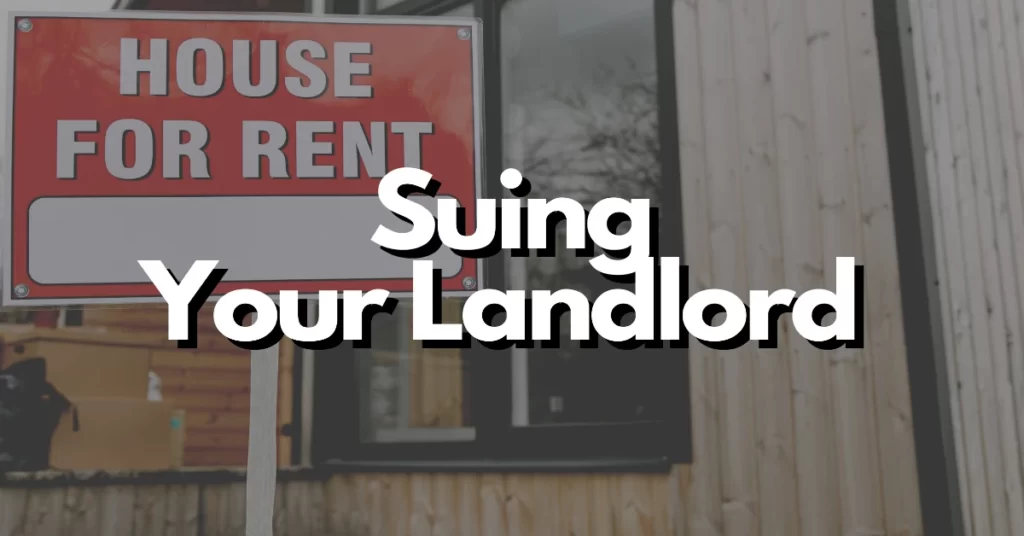Renting a home can offer the convenience of not having to worry about maintenance and repairs, but what do you do when your landlord fails to uphold their end of the bargain?
From pest infestations to unsafe living conditions, there are instances when tenants feel they have no choice but to take legal action against their landlords. If you find yourself facing such a situation, it’s crucial to understand your rights and the steps involved in pursuing a lawsuit against your landlord.
In this guide, we’ll explore whether you can sue your landlord and provide you with a step-by-step roadmap to help you navigate this challenging terrain.
Can You Sue Your Landlord?
Before diving into the legal intricacies, it’s essential to determine whether you have grounds to sue your landlord. Landlord-tenant laws vary from state to state, but there are common situations where tenants may consider taking legal action:
Breach of Lease Agreement: If your landlord fails to fulfill their obligations outlined in the lease agreement, such as not making necessary repairs or not providing essential services, you may have a valid reason to sue.
Uninhabitable Conditions: Landlords are legally responsible for ensuring that their rental properties meet basic health and safety standards. If your rental unit becomes uninhabitable due to issues like mold, water leaks, or pest infestations, you may have a case.
Violation of Tenant Rights: Landlords must respect tenants’ rights, including privacy and freedom from discrimination. If your landlord violates your rights or engages in harassment, you may have legal recourse.
Security Deposit Disputes: Disputes over the return of your security deposit, such as unjust deductions or failure to return it within the legally required timeframe, can lead to legal action.
Retaliation: If you’ve exercised your legal rights as a tenant, such as reporting code violations, and your landlord responds with retaliatory actions like eviction or rent increases, you may have a case.
Steps to Sue Your Landlord
If you believe you have a legitimate reason to sue your landlord, follow these steps to navigate the legal process:
1. Review Your Lease Agreement: Start by thoroughly reviewing your lease agreement. It’s crucial to understand your rights and responsibilities as a tenant and your landlord’s obligations. Ensure you’re in compliance with the terms of the lease.
2. Document the Issue: Keep detailed records of the issue or issues that have led you to consider legal action. This should include photographs, videos, correspondence, and any relevant dates.
3. Communicate with Your Landlord: Before jumping into a lawsuit, attempt to resolve the issue through communication with your landlord. Send written requests for necessary repairs or corrections, and keep copies of all correspondence.
4. Contact Local Authorities: If your landlord remains unresponsive or the issue is severe, consider reaching out to local housing authorities or code enforcement agencies. They can inspect your rental unit and potentially force your landlord to make necessary repairs.
5. Consult an Attorney: If all else fails, consult with an experienced landlord-tenant attorney. They can assess your case, provide legal advice, and guide you through the process. Many attorneys offer free initial consultations.
6. Demand Letter: Your attorney may draft a demand letter to your landlord, outlining the issue, the desired resolution, and a deadline for compliance. A well-crafted demand letter often prompts landlords to take action to avoid legal proceedings.
7. Initiate Legal Action: If your landlord continues to neglect their responsibilities, your attorney can help you initiate legal action. The specific legal steps may vary depending on your situation, but common options include:
- Filing a Lawsuit: This involves initiating a formal lawsuit in civil court, which can lead to a court-ordered resolution or financial compensation.
- Withholding Rent: Some states allow tenants to withhold rent until the landlord makes necessary repairs. Be sure to follow your state’s laws closely if pursuing this option.
- Repair and Deduct: In some cases, tenants can make the required repairs themselves and deduct the cost from their rent. However, this is subject to specific legal conditions.
8. Attend Court Hearings: If your case proceeds to court, be prepared to attend hearings and present evidence. Your attorney will guide you through this process and represent your interests.
9. Seek Damages: Depending on the outcome of your case, you may be entitled to damages, such as reimbursement for repair costs, reduced rent, or compensation for emotional distress.
Conclusion
While taking legal action against your landlord can be a complex and challenging process, it’s essential to know your rights and options when facing difficult living conditions or landlord misconduct. By documenting the issue, seeking legal counsel, and following the appropriate legal procedures, you can pursue a resolution and hold your landlord accountable for their responsibilities.
Remember that consulting with an attorney experienced in landlord-tenant matters can greatly enhance your chances of a successful outcome in court.

